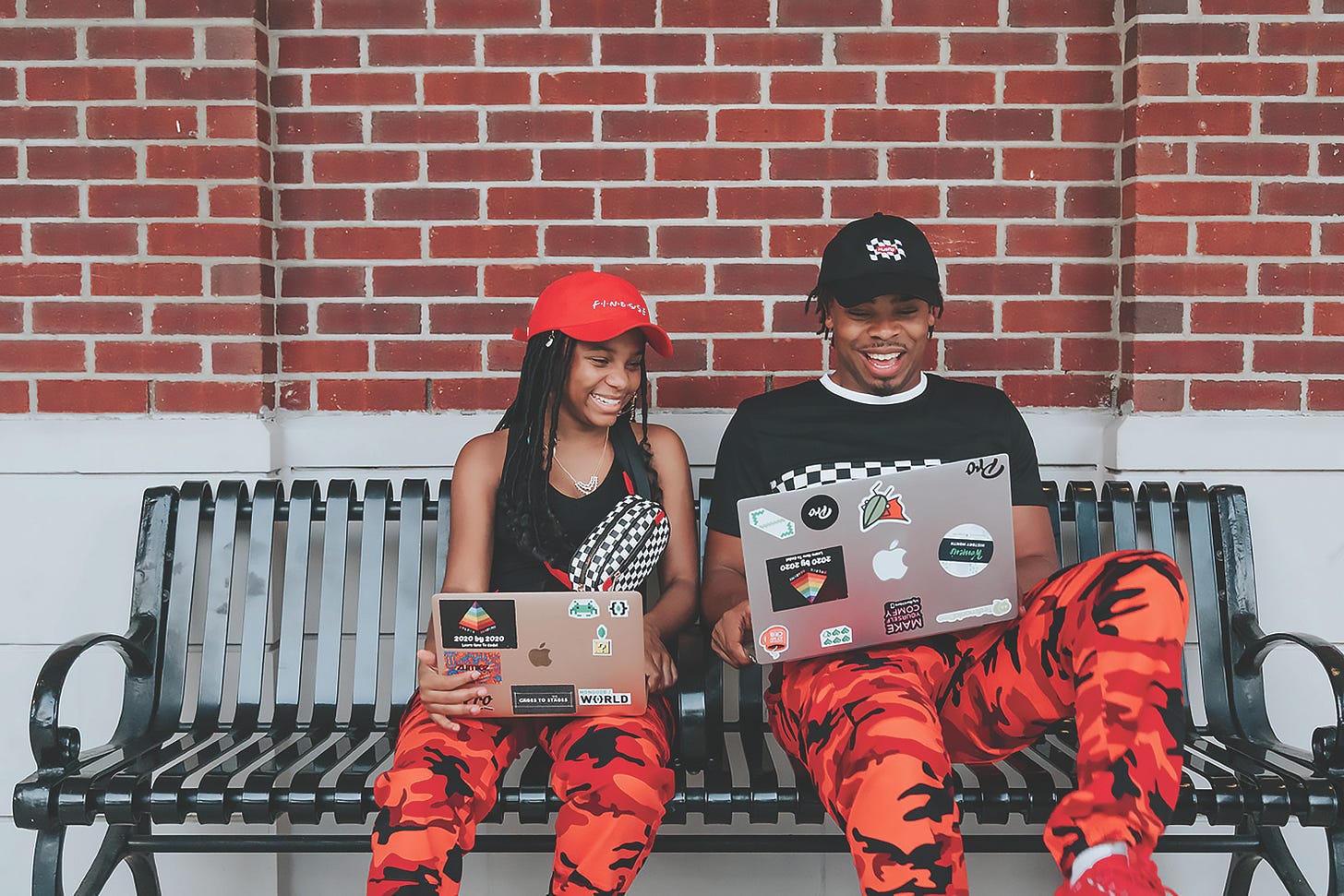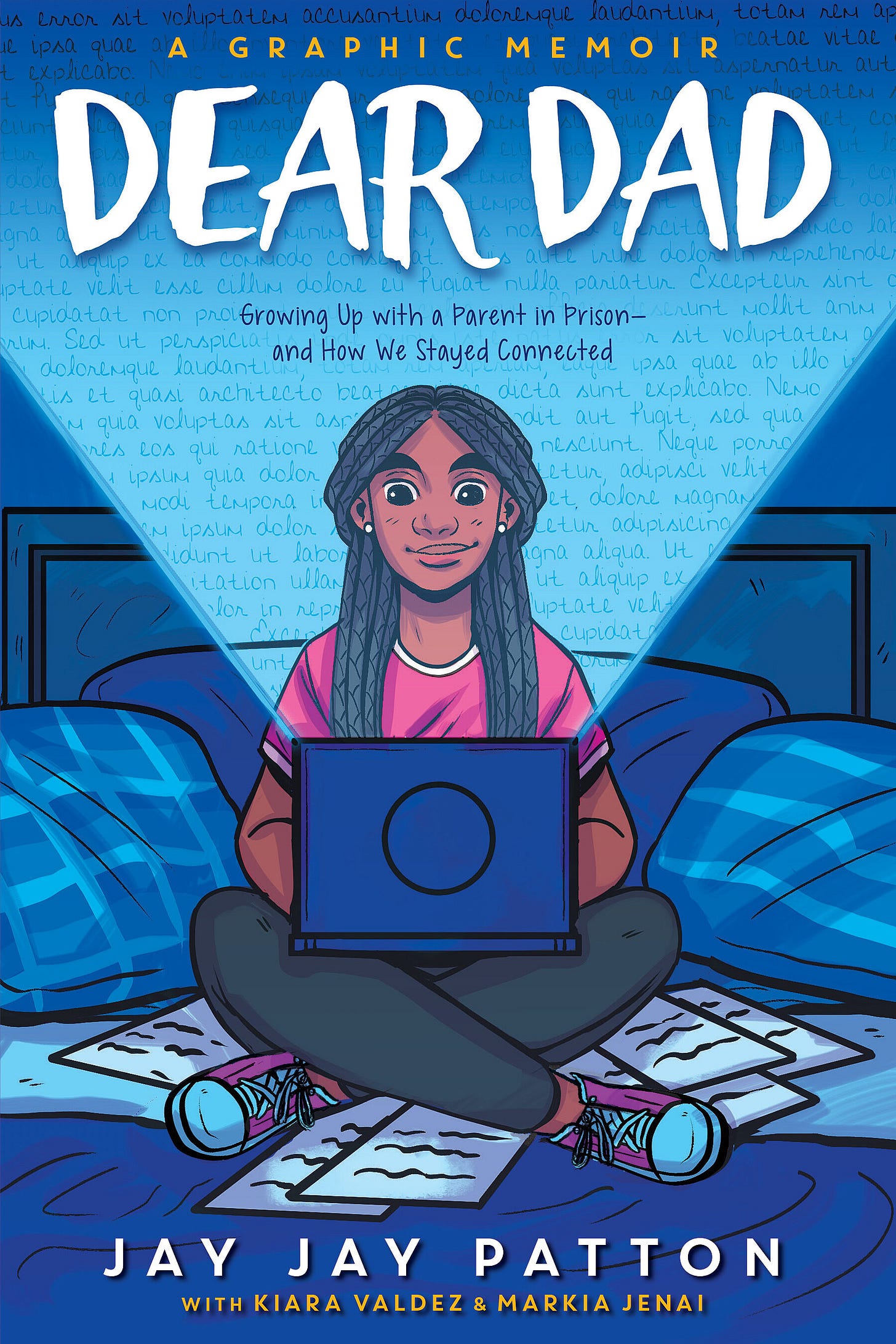Parenting While Incarcerated-Father's Day Edition
The challenges are on a whole other level.
Father’s Day is around the corner. This day holds significance for some while, for others, it passes like any other day. For some families, though, it can be another painful reminder of separation through incarceration. Because of the systemic oppression of African American men, this has led to more than 1.1 million African American men being imprisoned in the United States, and approximately 500,000 of those are fathers, as of 2023. The impact is far-reaching and devastating to not only fathers but also the children who are affected. Their ability to stay connected is becoming even more diminished as some prisons are moving away from in-person visits to video visits, where families are responsible for these expensive costs. Read here about advocacy to change this in New York State.
This Father’s Day, Tabitha spoke with Antoine and Jay’Aina (also known as Jay Jay) Patton, a father and daughter duo who experienced the pain of separation due to incarceration and decided to do something to help other families move through this difficult time while maintaining connection. Jay’Aina was only 3 when her father went to prison for 8 years and during his time there, Antoine taught himself how to code. Together, they launched an app called Photo Patch that offers one way for parents and kids to stay connected when a parent is incarcerated.
Jay’Aina even wrote a graphic novel about their experiences called Dear Dad, to be released in September 2024. Dear Dad is a compelling, kid-appropriate story of separation, incarceration, connection and resilience that all kids (and parents!) need to read. Our 9-year-old son spied our advanced copy in the kitchen and was hungry to delve in.
Here, Antoine and Jay’Aina talk about their relationship, lessons from the book, the groundbreaking app and what they’d like others to know about the experience of families impacted by incarceration.
Tell me a little about you both and about Photo Patch.
Antoine: I’m Antoine Patton, a software developer based out of Atlanta, GA. I am originally from Buffalo, NY; one of the hardest cities to grow up in mainly because of the lack of guidance and opportunities. I made a lot of mistakes in my teenage years just trying to figure it out. My mother had 5 kids, and I was the middle child. It hurt the family a lot when I ended up going to prison for eight years when I was just twenty years old. Of course, it affected Jay’Aina, too, because she was only three years old at the time. Her mother, Gina, was strong enough to be a single parent and raise Jay’Aina while I was away. I didn’t want my time to go to waste while incarcerated so I spent all the time I had increasing my education so I could be a provider upon release. I also self-taught myself how to code on the old computers they had in prison. That skillset allowed me to create the concept of Photo Patch which was birthed out of my wish to communicate more with Jay’Aina. She would send me letters and drawings that would light up my day. However, she only could send so many because she would need help sending them out. Her mom was extremely busy balancing parenthood, work, and self-time, so I would only get letters every 1-2 months. So my vision for Photo Patch was an application for kids to be able to communicate without having to understand postage and post offices. Just type a message, attach some pictures, and click send. I built the prototype during prison and upon release, we established the non-profit organization that would become Photo Patch Foundation. Jay’Aina has been helping lead since day one. Not only did she build the mobile app, but she attended board meetings, events, and fundraisers. She has a real heart for helping those going through hard times.
Jay’Aina, what was the most difficult part of having a parent who was incarcerated?
Jay’Aina: The most difficult part for me was not being able to have certain moments with my father like some kids were able to. I couldn’t go to father-daughter dances or things like that. He wasn’t able to attend graduations and birthdays or just little moments I wanted him a part of, which was hard.
There are so many lessons in the book: Asking for help makes you stronger, parents and kids need to meet each other halfway, honesty is best with kids even when they're young. Any other big lessons you learned from each other on this journey?
Antoine: Good question. I have learned a lot from Jay’Aina. She is very knowledgeable when it comes to current world affairs, music, and mindset. As a kid, she was known for her optimistic spirit. Always very positive even during trying times. A big lesson I learned from her was about how to trust the process. As a parent who didn’t feel that protected or appreciated as a child, I was more prone to be overprotective as a parent. Jay’Aina showed me and her mother that she could handle herself. Seeing Jay’Aina handle conflicts alone, travel abroad alone, and handle business calls alone helped me undo a lot of my preconceived notions about parenting. Oh, and one more lesson I’ve learned from Jay’Aina is the art of being humble! We have gotten a lot of press and each time she would be as calm as the night sky. It helped me learn that humility is the way to tame the ego.
Jay’Aina, what do you wish people knew about what kids need when it comes to communicating with their parents while they're incarcerated?
Jay’Aina: I wish they knew how hard it actually is to be in consistent communication with an incarcerated parent. Letters can get very tedious and expensive. Getting things printed and stamps and envelopes, that all adds up plus there are times letters don’t even make it. They can get sent back for the slightest thing and the person on the other side is just left waiting and it takes a while for this process. Phone calls are way more expensive and my mom didn’t have a car so visits were very sparse so keeping that communication and bond is so difficult.
Antoine, what do you wish people knew about what parents need when it comes to communicating with their kids while incarcerated?
Antoine: I wish people knew how important it is for kids and their parents to maintain a relationship and mode of communication. Because I wasn’t able to communicate with Jay’Aina as much as I wanted to, I didn’t understand her as much as I wanted to. And now upon release, the parent is trying to pack years and years of missed time into a couple of days, months, or years. Communication can be therapeutic so it’s important for there to be a way for both parent and child to vent their feelings, concerns, wishes, and hopes. The more communication parents and children can have during the incarceration process, the less work will need to be done post-prison.
Antoine, can you share about the transition to parenting while incarcerated to parenting at home?
Antoine: It was a tough process. In prison, my role was easy. Just say all the things a good parent is supposed to say. But outside of prison, I have to make decisions. I have to show up. I have to be patient with the process. I have to balance parenting while running three businesses, still pursuing my creative aspirations, figuring out who I am as an adult, taking care of family and extended family, volunteering and still trying to find time for self-care. I like to say I am still a novice at parenting. Luckily I have a partner like Gina who has been a phenomenal mom to Jay’Aina and our other three children. So I’m learning how to lean more on the wisdom of Gina. I wish there was a way for people in prison to get more practice with parenting because otherwise it’s just all theory. I was still a child myself when we brought Jay’Aina into this world and when I went to prison. Parenting classes in prison would have helped me plenty and saved me a lot of stress and errors.
Antoine, what's the biggest joy you've experienced as a dad since being released?
Antoine: I’ve learned to appreciate the simple things. I love that all of my children love to swim. Jay’Aina, being that she’s the oldest, was of course the first to grow a passion for swimming. But she has since helped her younger siblings learn as well. It’s something about seeing my kids swim that brings me joy. They look so free and happy when they are in the water. I also really enjoy it when we all have dinner together and we all take turns saying the things we are thankful for. It’s a beautiful moment of peace and gratitude.
Is there anything that is important for people to advocate for as it pertains to families who are impacted by incarceration? e.g. policies, laws, etc.
Antoine: I would say it’s worth noting that when men and women are sent to prison, they are usually placed in prisons that are hours away from their hometown. If they are doing federal time, men and women are sent to prisons that are in different states from their family. So I believe it’s important for families to stay connected through hard times. The criminal justice system doesn’t pay attention to the damage that is done to parents and children mentally and the long-term effects of separation. I think that’s worth advocating for.
How are you celebrating Father's Day this year?
Antoine: I will be traveling for Father’s Day this year. I have been trying to do more volunteer work lately since my business and this economy always have me thinking about the next dollar. I am bringing balance back to my mind and spirit by doing things out of pure love. That is a big part of who I am as a person and when I lose sight of that, I lose sight of my purpose.
You can preorder Dear Dad or look out for it at your local bookstore on September 17.
That’s it from us today. Take care of yourselves, y’all. And love up on your kids, okay?
Tabitha & Adam




